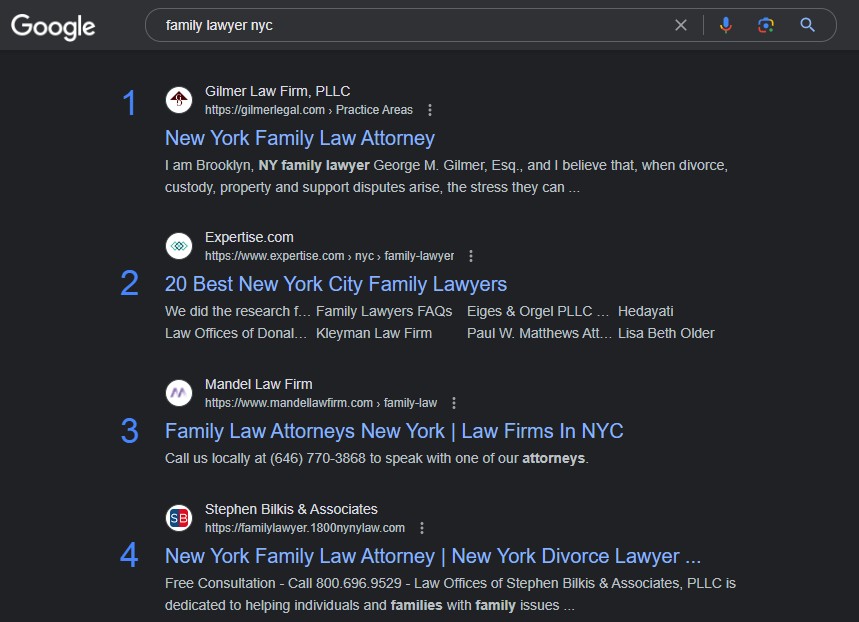
Law firm link building is challenging. However, with the right set of legal link building tactics, you can attract high-authority backlinks to your website.
By acquiring good-quality backlinks from reputable websites, lawyers can improve their website's search engine rankings and enhance their credibility and visibility.
In this article, I will share eight powerful link building tactics specifically tailored for lawyers.
These tactics will empower legal professionals to strengthen their SEO, drive organic traffic, and connect meaningfully with their target audience.
Importance of Link Building For Lawyers
Link building is among the most important marketing elements for lawyers and law firms.
Backlinks from relevant and authoritative websites help to raise your website authority, leading to an improved reputation online.
Here are a few reasons why link building is crucial for legal professionals:
Improved Search Engine Rankings
Search engines consider backlinks as a major ranking factor.
By acquiring high-quality backlinks from authoritative websites, lawyers can improve their website's visibility in search engine results pages (SERPs).

Higher rankings increase organic traffic, allowing lawyers to reach a wider audience and attract potential clients.
Enhanced Credibility and Authority
When reputable websites link back to a lawyer's website, it signals trust and credibility to search engines and users.
Backlinks from trusted sources establish the lawyer as an authority in their field and enhance their professional reputation. This credibility can greatly influence potential clients' decision-making when seeking legal services.
Increased Website Traffic
When you build lots of high-quality backlinks, it can increase your firm's organic ranking for targeted keywords, leading to more organic traffic to your law firm website.
Besides, when relevant websites link to your content, users interested in legal matters are likely to click through to your website.
This organic traffic can lead to potential client conversions and increase the chances of securing new cases.
Expanded Online Visibility
Link building helps lawyers expand their online presence beyond their website.
By securing backlinks from reputable legal directories, industry blogs, and authoritative legal publications, lawyers can reach a broader audience that may not have been aware of their services.
This increased visibility increases the likelihood of being discovered by potential clients.
Long-Term Benefits
Effective link building strategies result in lasting benefits.
Once established, high-quality backlinks can continue to drive traffic and improve search rankings over time.
This long-term impact ensures that lawyers remain competitive in the online landscape, even as the digital environment evolves.
Top 8 Link Building Strategies For Lawyers
Backlinks from reputable and trustworthy sources serve as a vote of confidence for attorneys. This helps build trust and confidence among potential clients seeking legal representation.
Here are the top eight link building tactics for lawyers:
Get Listed in Legal Directories
Research and identify reputable legal directories relevant to your practice area and jurisdiction.
Look for directories with a strong online presence and a good reputation, and attract significant traffic from potential clients seeking legal services.
Create a compelling attorney profile that effectively highlights your unique selling points, areas of expertise, and notable achievements.
Follow the directory's submission process to submit your listing request. Some legal directories offer paid listing options that provide additional visibility and benefits. You can subscribe to these if you have a good link building budget.
Here are some of the top legal web directories for attorneys that you can use for law firm link building:
Avvo
Avvo is a widely recognized legal directory that provides lawyer ratings, reviews, and a comprehensive profile for attorneys. It covers various practice areas and allows potential clients to search and compare lawyers based on their ratings and reviews.
Justia
Justia is a popular legal directory that provides a platform for lawyers to create comprehensive profiles, including their practice areas, contact information, and links to their websites and social media accounts.
FindLaw

FindLaw is a leading legal directory offering an extensive lawyers database across different practice areas and jurisdictions. Lawyers can create detailed profiles with contact information, practice areas, and website links. FindLaw also provides legal resources and articles for users.
Lawyers.com
Lawyers.com is a comprehensive legal directory that covers a wide range of practice areas and allows users to search for lawyers based on location and practice area. Lawyers can create profiles with their contact information, areas of practice, and client reviews.
Nolo
Nolo is a legal directory that focuses on providing law information and resources to consumers. Lawyers can create profiles with contact details, practice areas, and website links. Nolo also offers opportunities for lawyers to contribute articles and answer legal questions.
Get a Link from Your Alma Mater’s Website
Explore your alma mater's website and identify potential link opportunities. Look for sections such as alumni profiles, news sections, or graduates association pages where they may feature their professional achievements.

Engage with your alumni network to connect with the appropriate individuals who can help facilitate the link.
Prepare a well-written profile or news story highlighting your achievements, legal expertise, and any notable contributions to the legal profession. Focus on showcasing your unique experiences, notable cases, awards, or other achievements that interest your university’s audience.
Getting a link from your old school’s website helps with link building and showcases your affiliation and credibility as an alumni lawyer.
Complete Social Profiles
Identify and evaluate the social media platforms where your target audience is most found and which align with your marketing goals.
Leverage the top social media platforms for lawyers, including LinkedIn, Twitter, and Facebook, to increase your audience reach. You should mainly focus on platforms where you can connect with potential clients, engage with industry peers, and share valuable legal insights.
Ensure that the contact information on your social handles is updated with a clear display. And remember to include your law firm's NAP and website URL so clients can reach out to you easily.
Create a compelling and concise bio highlighting your expertise, legal experience, and notable achievements.
Use keywords related to your practice areas to enhance search visibility and tailor your bio to each platform while maintaining a consistent professional brand across all social profiles.
Regularly share relevant and valuable content related to your practice areas to engage with your audience. This could include legal updates, articles, blog posts, industry insights, or commentary on law-related matters. Consistent and meaningful content demonstrates your knowledge and positions you as an authority in your field.
For example, the Wilshire law firm in Los Angeles has all their social profiles in sync and all of them link back to their main website.
Here is their Facebook profile:
Similarly, they have an optimized LinkedIn page having a link to their main website:
And, here is their Twitter profile:
Like the Wilshire law firm, you should also create social media profiles for your law firm and add a link to your website from every channel.
Perform Guest Posting for Lawyers
Guest posting is one of the best link building tactics for lawyers.
Start by using search engines like Google or Bing. Enter search terms like "lawyer guest posting", "write for us + lawyer", "guest post opportunities for lawyers", or similar variations.
Look for popular legal blogs, publications, and websites that cover topics related to law, legal advice, or specific areas of law.
Many of these sites have guest posting guidelines or submission pages. Compile a list of potential sites that accept guest posts.
Thoroughly review the guest post guidelines provided by each target website or blog. Pay special attention to their content requirements, word count, formatting guidelines, and any specific topics they are interested in.
Then, write a well-researched, engaging, and original guest post that provides value to the readers.
In your guest post, include a concise author bio showcasing your expertise, experience, and contact information.
Most importantly, include a link to your law firm's website or relevant pages within the bio. Ensure that the links are natural and relevant to the content of the guest post.
Here is an example of a legal guest post with a backlink in the author bio:
Answer HARO Requests
Answering HARO (Help a Reporter Out) requests is an effective way for lawyers to gain backlinks from popular media publications.
You can register as a source on the HARO platform to start receiving relevant journalist queries via email.
The service connects journalists with expert sources who can provide valuable insights for their articles.
Regularly review the emails that HARO sends to you to identify queries that align with your areas of legal expertise. Pay attention to the deadline and specific requirements mentioned in the request. Focus on queries related to legal topics or within your practice areas.
Offer unique insights, opinions, or data-backed information that adds value to the journalist's article.
Draw from your experience and provide specific examples, case studies, or legal precedents to support your points. Aim to provide clear and actionable information that can be easily incorporated into the journalist's piece.
Here is an example of a HARO email request for lawyers, attorneys, and law firms:
Create Linkable Assets
Linkable assets, also known as link-worthy assets, are high-quality content or resources on a website that are valuable and unique enough to attract links from other websites.
These assets are designed to provide value to the target audience and serve as a compelling reason for other website owners or bloggers to link to them.
You should develop in-depth legal guides that provide detailed information on specific practice areas, legal processes, or commonly asked questions. These guides can serve as go-to resources for legal information, attracting links from other websites, legal blogs, or educational institutions.
For example, case studies provide valuable insights into the legal strategies employed, making them attractive to other lawyers, law professionals, and industry publications.
Hence, you should create case studies that showcase successful legal outcomes or unique approaches to resolving consumer challenges, as ABV Solicitors highlighted their top cases to attract audience attention, gain credibility, and acquire backlinks.
Moreover, you can also conduct interviews with legal experts or host a legal podcast where you discuss relevant law-related topics.
By featuring authoritative voices in the field, these interviews or podcasts can attract links from other websites interested in sharing the insights and expertise provided.
Lastly, you can develop interactive tools or calculators that help users understand legal concepts, calculate damages, or estimate legal costs. These tools can be highly engaging and shareable, attracting links from websites or law-related resources that find them useful.
Answer Questions on Quora
Quora is a valuable platform for link building for lawyers. While direct link building through Quora is not allowed (as per Quora's policies), there are indirect ways to leverage it for link building purposes.
To begin with, you should set up a Quora profile that showcases your expertise as a lawyer. Include a professional bio, a high-quality headshot, and relevant background information.
Search for legal topics within your practice areas or areas of expertise on Quora, as shown in the below image.
Look for questions that align with your knowledge and experience. You can also follow relevant legal topics or create alerts to receive notifications for new questions related to your areas of interest.
When you publish informative blog posts or articles on your website, you can mention them in relevant Quora answers as a source of additional information. This can drive traffic to your content and potentially attract natural backlinks from other Quora users or publishers who find your content valuable.
Be Involved in the Local Community
Some community organizations, nonprofits, or local government entities may have websites that feature sponsors, donors, or supporters.
By actively participating and supporting these organizations, they may acknowledge your involvement on their websites, potentially including a backlink to your law firm's website.
Moreover, when you participate in community events, workshops, or seminars, you may be listed as a speaker or contributor on event websites or community calendars. These listings often include links to the speaker's or contributor's website, allowing you to generate backlinks while promoting your involvement.
Active involvement in the local community can result in positive experiences and relationships with individuals or organizations. They may be inclined to provide testimonials or positive reviews on their websites or online platforms, which can include backlinks to your website.
Link Quality vs. Quantity
When it comes to link building, the quality of links holds greater importance than sheer quantity.
While having a large number of links may initially seem beneficial, search engines now prioritize the quality and relevance of those links.
A single link from a highly reputable, authoritative, and contextually appropriate source in your industry carries more weight than multiple links from low-quality or irrelevant sites.
Search engines favor a natural and organic link profile that reflects genuine endorsements from other websites. An excessive number of low-quality or spammy links can raise red flags and potentially harm your website's rankings. It's crucial to focus on building a diverse and high-quality link portfolio over time.
Conclusion
The importance of link building cannot be overstated, as it has a strong correlation between ranking and traffic. Quality links from reputable and relevant sources significantly impact search engine rankings and help lawyers stand out in a competitive digital landscape.
It's essential to prioritize quality over quantity when building links, focusing on authoritative and contextually relevant sources that enhance credibility and user experience.
Hence, you should build a diverse and high-quality link portfolio that will improve search engine rankings, drive referral traffic, enhance brand reputation, and ultimately increase client acquisition.










